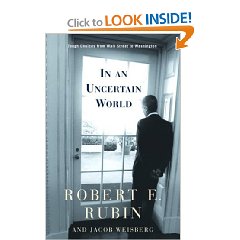2) Are correct in their condemnation of the Clinton national security team for being weak and incompetent. Any Democratic candidate foolish enough to appoint such individuals as their advisors is not smart enough to beat 43.
3) Make it clear that the top priority for neo-conservatives in the war on terrorism is not overseas action, but the implementation of a national identification card system here at home.
4) Are correct in their condemnation of US-based Muslim charities and clerics (and FBI agents of the Muslim faith) unwilling to speak out against Islamic radicalization and those who recommend jihad in America, abusing our freedom of speech. They are also correct when they propose to end all tax exemptions and breaks for those that fail to condemn terrorism and fatwas against Americans.
5) Are correct when they point out that the trillions of dollars we have spent on national intelligence have resulted in a vacuum on both Iraq and weapons of mass destruction, and a lack of knowledge about terrorist financing.
6) They are correct when they emphasize the importance of funding the education and elevation of women into power within Islamic societies.
7) Are correct when they point out that with the exception of Jordan, no Arab country has been willing to give Palestinians a break–no access to schools, ownership of land, or passports. Lebanon, they say, forbids Palestinians from 72 professions.
8) Are correct when they point out that we are “fighting the war on terror with the same people and the same bureaucracies that so conspicuously failed us on 9/11.” They are especially powerful when they criticize the CIA for failing to collect, read, translate, or understand the openly published writings of Khomeini during the Carter years–CIA is operating on perhaps 2% of the available global knowledge because it obsesses on spying and disrespects open sources of information in 29 languages–something Herb Meyer understood when he was Special Assistant to then DCI Bill Casey.
8) Are correct when they characterize the US Army specifically, and the entire US military generally, as “forces of the past, built to counter threats that no longer exist.”
9) Are correct to emphasize how the U.S. Government as a whole is completely fragmented and lacking in an inter-agency management and coordination structure that both Kissinger and Rubin have suggested is urgently required to keep pace with the threats and demands of the modern world.
10) Are correct to slam the FBI for being incompetent at counter-intelligence, and to call for a new national homeland security agency reporting to the secretary for homeland security. They do however overlook the equal importance of funding state and local intelligence centers and counterintelligence personnel.
11) Are correct to emphasize that US free trade agreements with various nations should demand that the nations sign the same agreement with one another (e.g. in South Asia).
12) Are correct to point out that the United Nations and its focus on “armed attack” is completely out-dated, and that America should increase and sustain its support to the UN only on condition that the UN modernize both its by-laws and its operating procedures.
13) Are correct to propose that national security funding should rise to 5% of the national budget, up from 3%, but they fail to understand that modern warfare requires co-equal funding for non-military sources of power including massive preventive *peace* operations.
There is, then, a great deal of good in this book. It is, however, also full of a great deal of crap. It has no footnotes, no bibliography, no index, and a great deal of either badly researched material or plain disinformation. They misrepresent or ignore a number of very important facts. On page 24, for example, they discuss the debriefing of Hussein's son-in-law, defector Hussein Kamel, and fail to mention that he told us all the stocks had been destroyed, and only the cookbooks remained. Throughout the book, while lambasting CIA for not knowing (half true), they decline to discuss the unethical and unprofessional manner in which the neo-cons not only shut out the professionals from the Iraq war deliberations, but cherry-picked and fabricated information to mislead the president as well as the American people. On page 32 and again on page 35 they lie when they say that Iraq was “one of the leading sponsors of terrorism in the region.” On various pages they gloss over the fact that Chalabi was both a thief and a liar, fired by CIA for stealing millions from covert funds, and ultimately found by CIA to be fabricating translations to deceive the US military intelligence people. On pages 45-46 they repeat the long proven lie about Mohammed Atta meeting an Iraqi intelligence officer in Prague. Not only has the FBI determined that Atta was in Florida at the time, but Vaclav Havel, former President of Czechoslovakia, recently honored by President Bush, has repeatedly stated this did not happen. On page 155, they deliberately avoid mentioning that it was Rumsfeld who allowed 3000 Taliban and Al Qaeda leaders to escape by approving a Pakistani air evacuation operation that went on all night. Rumsfeld's naiveté and ignorance cost us the chance to nail Bin Laden early on. There are many other points where the facts differ from their representations.
The book does *not* offer a true strategy for the future of American security or even the near-term war on terrorism. It is largely a baloney justification for the war on Iraq. It fails to acknowledge that unilateralist American behavior is spawning more terrorists than we are catching. On balance, this book is worth reading to understand both the good and the bad of the neo-conservative viewpoint.











